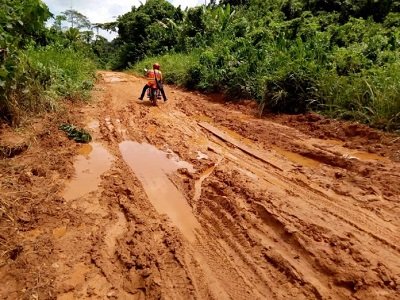News
Poor roads: Enemy of development

The state of our roads has been on my mind for some time now. No doubt there had been a major improvement in the overall road network in Ghana over the years. Yet, after 64years of Independence what Ghana can show on for its major highways is a complete disgrace.
For instance, the road linking our two major cities Accra-Kumasi is nothing more than a single-lane death trap! A distance of only 250 Km, it takes over five hours and if you are not lucky, it will take your life as well. How much more with the road networks linking deprived communities?
Sufficient evidence abounds that, the media houses are awash with complaints about bad roads and the need for the central government or district assemblies to step in to fix them.
Reliable and dependable roads help to facilitate the smooth movement of goods and people, create employment, support economic growth, enhance access to education and healthcare services, and connect people to families and places of entertainment. This also goes a long way in aiding in the fight against poverty.
In Ghana, road transport is one of the major keys which enhance economic potential. It is estimated that road transport alone accounts for 96 per cent of passenger and freight traffic and about 97 per cent of passenger in the country.
That is why sustainable development of our road infrastructure cannot be downplayed. As a result, I believe that placing a lot more premium on developing our road infrastructure will definitely be a step in the right direction.
Nonetheless, lately, there have been concerns across the country over the poor conditions of our roads. The country’s roads have seen further deterioration as a result of the heavy rains experienced recently.
For example, the pothole-ridden roads in Accra and other parts of the country are increasingly becoming alarming and worrying, which make the cost of road transport high and very risky.
Fortunately, Ghana has consistently been one of the countries in the top ranks of the African Development Bank’s Africa Infrastructure Development Index (AIDI), attracting funding for roads infrastructure.
That notwithstanding, there is still more road infrastructure deficit requiring urgent attention from the government. Efforts should, therefore, be put in place to save the situation.
Truth is, among the many modes of transport, road transport is the commonest. However, poor road infrastructure hinders road transport and curtails development and mobility.
It may interest readers to know that rural areas are places for the production of primary goods and services worldwide.
It is for this reason that the government should be able to take the necessary steps to invest more in road infrastructure so that the citizens can gain access to the remotest parts of the country in order to unlock the vast and untapped reservoir of productive potential in those areas.
Although the link between roads and human development is not well established, data from low-income countries demonstrate that communities living furthest from good roads experience higher levels of poverty, lower levels of school attendance and worse health outcomes.
This has become one of the reasons there are frequent agitations by some community members for the government to fix their roads.
The problem of poor road network can be addressed when a routine monitoring and evaluation mechanism is built into the road infrastructure investment policies to ensure that road construction carried out by contractors are properly done.
Furthermore, the government must always follow up on reports to check whether projects being implemented are done properly. This will become feasible when standards assessments are given the number one priority.
That is why, it is imperative that adequate investment is made into the road sector with proper monitoring and evaluation. Such measures when fully instituted, will ensure that the issue of poor roads and potholes will be a thing of the past.
By Donatella Esinam Kudoto
The writer is a student of the Ghana Institute of Journalism
Email: Dona.esi.15@gmail.com
News
Watch your mattresses!…they can cause chronic back pain, other health disorders

Local mattress manufacturers have raised serious concerns over the influx of substandard mattresses, warning that these products pose significant health risks to consumers and threaten the sustainability of Ghana’s mattress industry.
At a press briefing held in Kumasi on Tuesday, manufacturers accused unregistered foreign entities, particularly Chinese firms, of flooding the market with cheap mattresses made from polystyrene.
Mr Yaw Ampem Darko, a spokesperson for the local manufacturers, warned that prolonged use of substandard mattresses, especially those made with polystyrene, could result in chronic back pain, musculoskeletal disorders, poor posture, and diminished sleep quality.
These health implications, they stressed, were not always immediately evident but accumulate over time, especially among vulnerable populations such as children and the elderly.
This material, typically used for packaging, is considered unsuitable and unsafe for bedding.
According to industry leaders, these sub-standard products have been circulating for at least five years, gaining traction among unsuspecting consumers due to their unusually low prices.
“These mattresses are being sold at suspiciously low prices, luring unsuspecting consumers who are unaware of the health dangers.”
“We are not just protecting our businesses; we are protecting Ghanaian lives. The government must act swiftly to stem this tide before more citizens fall victim to these dangerous products,” Mr Yaw Ampem Darko stated.
The Ghana Standards Authority (GSA) has acknowledged the issue and, in response, announced a nationwide enforcement campaign aimed at clamping down on the production, distribution, and sale of substandard mattresses.
The campaign, which was scheduled to take effect from September 30, 2025, was empowered by the GSA Act, 2022 (Act 1078), which authorises the Authority to seize and seal non-compliant products and impose sanctions on offenders.
In a statement signed by the Director General of the GSA, Professor George Agyei, the authority cited Sections 29 and 43 of the Act, reiterating that all mattresses sold in Ghana must meet established national standards or face confiscation.
The statement further emphasised that mattresses failing to meet these standards not only compromise sleep quality but also contribute to long-term health complications, including spinal and neck pain.
Despite the GSA’s commitment, manufacturers have expressed frustration over delays in implementation and called for stronger enforcement mechanisms.
They urged the GSA to work in close collaboration with the Customs Division of the Ghana Revenue Authority and national law enforcement agencies to identify and prosecute violators of Ghana’s quality standards.
Manufacturers are also appealing to consumers to remain vigilant and prioritise their health by verifying that any mattress they purchase bears the GSA certification mark.
Moreover, they caution the public against purchasing suspiciously cheap mattresses that lack proper labelling or identifiable branding, as these were often indicators of substandard or counterfeit products.
As the official enforcement deadline had expired with no show, the local producers insisted that much more than business interests were at stake.
They argued that without swift and sustained action, the health and safety of Ghanaian consumers would continue to be compromised.
“Public awareness, strict enforcement, and collaboration among regulatory bodies are essential if we are to protect the integrity of the local industry and the wellbeing of the Ghanaian people,” Mr Darko indicated.
From Kingsley E. Hope, Kumasi
Join our WhatsApp Channel now!
https://whatsapp.com/channel/0029VbBElzjInlqHhl1aTU27
News
Raissa Initiative demands harsher punishment for sexual abusers of girls

The Founder of the Raissa Child Protection Initiative, Ms Raissa Sambou, has urged authorities to impose severe punishment on individuals, including teachers and guardians, who sexually abuse young girls.
Speaking in an interview to mark this year’s International Day of the Girl Child (October 11), Ms Sambou condemned the increasing cases of sexual exploitation involving minors, describing such acts as “heartless, criminal, and a total betrayal of trust.”
She noted that those entrusted with the care and education of children must not be the same people who violate them, stressing that “anyone found guilty of abusing a girl child must face the full rigours of the law without leniency.”
The International Day of the Girl Child is observed annually to promote the rights of girls, empower them to reach their full potential, and draw attention to the challenges they face worldwide.
Ms Sambou lamented that poverty continues to push many young girls into vulnerable situations, exposing them to exploitation.
She expressed concern that some headmasters, teachers, and community members who should protect girls rather take advantage of them.
“This must stop immediately. The safety of every girl must never be compromised,” she said, urging the public to report all forms of abuse to the appropriate authorities and called for swift action by law enforcement agencies against perpetrators.
Addressing girls directly, Ms Sambou encouraged them to take their education seriously and to believe in their potential.
“It is possible to be young and responsible. Your future is bright, protect it, believe in it, and never let anyone dim your light,” she advised.
She further urged girls to choose their friends wisely, stay disciplined, and speak up if anyone makes sexual advances toward them.
Ms Sambou concluded with a rallying call for collective action, saying “speak up, protect them, and empower them. Together, we can end the sexual exploitation of girls.”
By Esinam Jemima Kuatsinu
Join our WhatsApp Channel now!
https://whatsapp.com/channel/0029VbBElzjInlqHhl1aTU27






